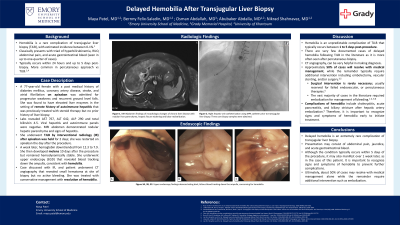Sunday Poster Session
Category: Liver
P1000 - Delayed Hemobilia After Transjugular Liver Biopsy
Sunday, October 22, 2023
3:30 PM - 7:00 PM PT
Location: Exhibit Hall

Has Audio

Maya Patel, MS, MD
Emory University School of Medicine
Atlanta, GA
Presenting Author(s)
Maya Patel, MS, MD1, Bernny Felix-Saladin, MD1, Osman Abdallah, MD2, Abubaker Abdalla, MD3, Nikrad Shahnavaz, MD1
1Emory University School of Medicine, Atlanta, GA; 2University of Khartoum, Khartoum, Khartoum, Sudan; 3Emory University, Atlanta, GA
Introduction: Hemobilia is a rare complication of transjugular liver biopsy (TJLB), with an estimated incidence between 0-1%. The condition classically presents with a triad of right upper quadrant abdominal pain, hyperbilirubinemia/jaundice, and acute gastrointestinal bleed, although this triad is only seen in about one quarter of cases. Hemobilia typically occurs within 24 hours and up to 5 days post-biopsy and is less common in TJLB compared to percutaneous liver biopsies. Herein we present an unusual case of delayed hemobilia.
Case Description/Methods: A 77-year-old female with a past medical history of diabetes mellitus, coronary artery disease, stroke with residual deficits, and atrial fibrillation on apixaban was admitted to the hospital for evaluation of progressive weakness after recurrent ground level falls at home. She was noted to have elevated liver enzymes in the setting of remote history of autoimmune (AI) hepatitis that was previously treated with steroid therapy; she had no prior history of liver biopsy. Labs revealed AST 767, ALT 642, alkaline phosphatase 290 and total bilirubin 4.5. Viral hepatitis and AI panels were negative. MRI showed nodular hepatic parenchyma and signs of hepatitis. She underwent TJLB by interventional radiology (IR) after apixaban was held for ~2 days. She tolerated the procedure well and was restarted on apixaban the next day. The hospital course was complicated by downtrending hemoglobin one week later from 12.3 to 7.9. She developed melena 10 days after the procedure but remained hemodynamically stable. She then underwent upper endoscopy that revealed blood originating from the ampulla consistent with hemobilia. The case was discussed with IR, and she received computed tomography angiography (CTA) that revealed small hematoma at the site of biopsy but no active bleeding. She was treated with conservative management with resolution of hemobilia.
Discussion: Delayed hemobilia is an extremely rare complication of transjugular liver biopsy, and its presentation may consist of abdominal pain, jaundice, and acute gastrointestinal bleed. Although the condition typically occurs within 5 days of the procedure, it may also manifest over 1 week later, as in the case of our patient. Therefore, it is important to recognize the signs and symptoms associated with hemobilia and treat promptly to prevent further complications. Ultimately, about 50% of cases may resolve with medical management alone while the remainder require additional intervention such as embolization.

Disclosures:
Maya Patel, MS, MD1, Bernny Felix-Saladin, MD1, Osman Abdallah, MD2, Abubaker Abdalla, MD3, Nikrad Shahnavaz, MD1. P1000 - Delayed Hemobilia After Transjugular Liver Biopsy, ACG 2023 Annual Scientific Meeting Abstracts. Vancouver, BC, Canada: American College of Gastroenterology.
1Emory University School of Medicine, Atlanta, GA; 2University of Khartoum, Khartoum, Khartoum, Sudan; 3Emory University, Atlanta, GA
Introduction: Hemobilia is a rare complication of transjugular liver biopsy (TJLB), with an estimated incidence between 0-1%. The condition classically presents with a triad of right upper quadrant abdominal pain, hyperbilirubinemia/jaundice, and acute gastrointestinal bleed, although this triad is only seen in about one quarter of cases. Hemobilia typically occurs within 24 hours and up to 5 days post-biopsy and is less common in TJLB compared to percutaneous liver biopsies. Herein we present an unusual case of delayed hemobilia.
Case Description/Methods: A 77-year-old female with a past medical history of diabetes mellitus, coronary artery disease, stroke with residual deficits, and atrial fibrillation on apixaban was admitted to the hospital for evaluation of progressive weakness after recurrent ground level falls at home. She was noted to have elevated liver enzymes in the setting of remote history of autoimmune (AI) hepatitis that was previously treated with steroid therapy; she had no prior history of liver biopsy. Labs revealed AST 767, ALT 642, alkaline phosphatase 290 and total bilirubin 4.5. Viral hepatitis and AI panels were negative. MRI showed nodular hepatic parenchyma and signs of hepatitis. She underwent TJLB by interventional radiology (IR) after apixaban was held for ~2 days. She tolerated the procedure well and was restarted on apixaban the next day. The hospital course was complicated by downtrending hemoglobin one week later from 12.3 to 7.9. She developed melena 10 days after the procedure but remained hemodynamically stable. She then underwent upper endoscopy that revealed blood originating from the ampulla consistent with hemobilia. The case was discussed with IR, and she received computed tomography angiography (CTA) that revealed small hematoma at the site of biopsy but no active bleeding. She was treated with conservative management with resolution of hemobilia.
Discussion: Delayed hemobilia is an extremely rare complication of transjugular liver biopsy, and its presentation may consist of abdominal pain, jaundice, and acute gastrointestinal bleed. Although the condition typically occurs within 5 days of the procedure, it may also manifest over 1 week later, as in the case of our patient. Therefore, it is important to recognize the signs and symptoms associated with hemobilia and treat promptly to prevent further complications. Ultimately, about 50% of cases may resolve with medical management alone while the remainder require additional intervention such as embolization.

Figure: Figure 1. Endoscopic identification of bleeding originating from the ampulla.
Disclosures:
Maya Patel indicated no relevant financial relationships.
Bernny Felix-Saladin indicated no relevant financial relationships.
Osman Abdallah indicated no relevant financial relationships.
Abubaker Abdalla indicated no relevant financial relationships.
Nikrad Shahnavaz indicated no relevant financial relationships.
Maya Patel, MS, MD1, Bernny Felix-Saladin, MD1, Osman Abdallah, MD2, Abubaker Abdalla, MD3, Nikrad Shahnavaz, MD1. P1000 - Delayed Hemobilia After Transjugular Liver Biopsy, ACG 2023 Annual Scientific Meeting Abstracts. Vancouver, BC, Canada: American College of Gastroenterology.
